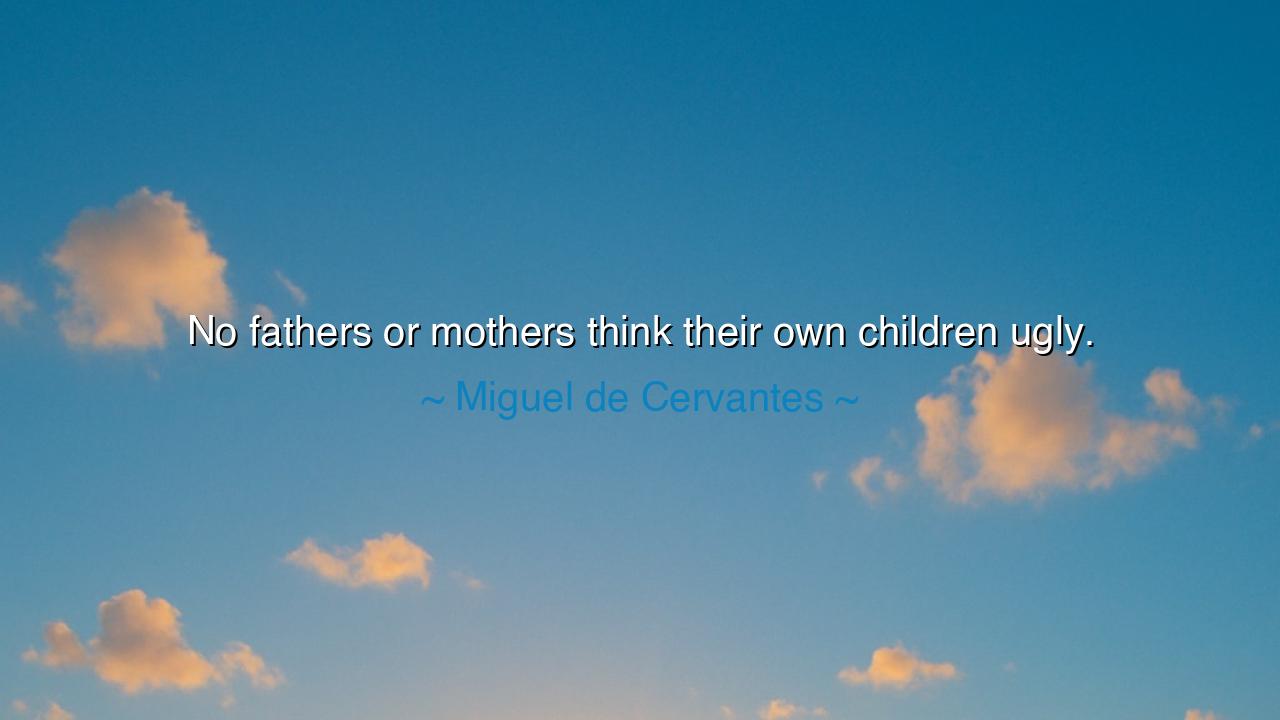
No fathers or mothers think their own children ugly.






The words of Miguel de Cervantes—“No fathers or mothers think their own children ugly.”—carry with them the timeless truth of parental love. He, the great author of Don Quixote, who wrote of folly and wisdom wrapped in the same breath, here reminds us that love is not blind, but transformative. For in the eyes of a parent, the child—whether strong or weak, fair or plain, clever or simple—is adorned with a beauty that surpasses appearance. This is not because the child is without flaw, but because love itself is the lens through which parents see.
The ancients knew this power well. In the myths of Greece, even when Hephaestus was cast from Olympus for his lameness, his mother Hera’s pain at the act was deep, for he was still her child. In the sagas of the Norse, mothers wept even over sons destined for ruin, seeing in them not monsters but their own blood. What Cervantes declares is not sentiment, but an eternal law of the heart: parents love not because their children are perfect, but because they are theirs.
History provides living examples. Consider President Abraham Lincoln, mocked in his youth for his awkward appearance. Many saw him as coarse, ill-favored, even strange in manner. Yet his stepmother, Sarah Bush Lincoln, spoke of him with pride and love, saying, “He was the best boy I ever saw.” To others, he may have seemed unremarkable, even unattractive, but to her, he was the treasure of her life. Her love did not distort reality—it revealed a deeper truth: the worth of a child cannot be measured by appearance, but by the bond of love that sees beyond the surface.
Cervantes also teaches us of the universality of parental affection. The poorest beggar, holding her infant in rags, looks upon that child with the same pride as a queen upon her royal heir. To both, the child is radiant. This is a lesson in humility for all who judge by outward standards: what the world might scorn, a parent treasures. It shows us that beauty is not fixed, but is shaped by devotion. In this way, parental love reveals a vision higher than mere human judgment—it partakes of the divine, which sees value where others see none.
There is wisdom here beyond the family circle. The principle that love creates beauty can guide how we treat others. If a parent’s love can make every child precious, then perhaps we, too, can learn to see others with compassion rather than with cold eyes of judgment. Every person is someone’s child, and once, someone looked at them with pride, seeing not ugliness but possibility. To remember this is to soften the heart and widen the circle of human kinship.
The lesson for us is clear: love reveals worth where the world sees none. Parents, cherish this gift, for it is both natural and sacred. Children, know that you are seen with a love that endures beyond flaw, beyond weakness, beyond the judgments of strangers. And all people, whether parents or not, should learn from this law of the heart—judge less by the outer form, and see more with the eyes of love.
Therefore, let your actions be these: honor the bond of parent and child. Do not scorn another’s child, for you do not see them as their parents do. Remember that beauty is more than appearance; it is love reflected. And in your own dealings, seek to look upon others not with disdain, but with the vision of compassion. In doing so, you mirror the eternal truth Cervantes revealed.
Thus, the words of Cervantes endure: “No fathers or mothers think their own children ugly.” They remind us that in love there is no ugliness, only devotion. In the eyes of parents, the ordinary becomes extraordinary, the plain becomes radiant, the flawed becomes beloved. And in that vision lies the deepest wisdom—that love does not merely observe beauty, it creates it.






AAdministratorAdministrator
Welcome, honored guests. Please leave a comment, we will respond soon